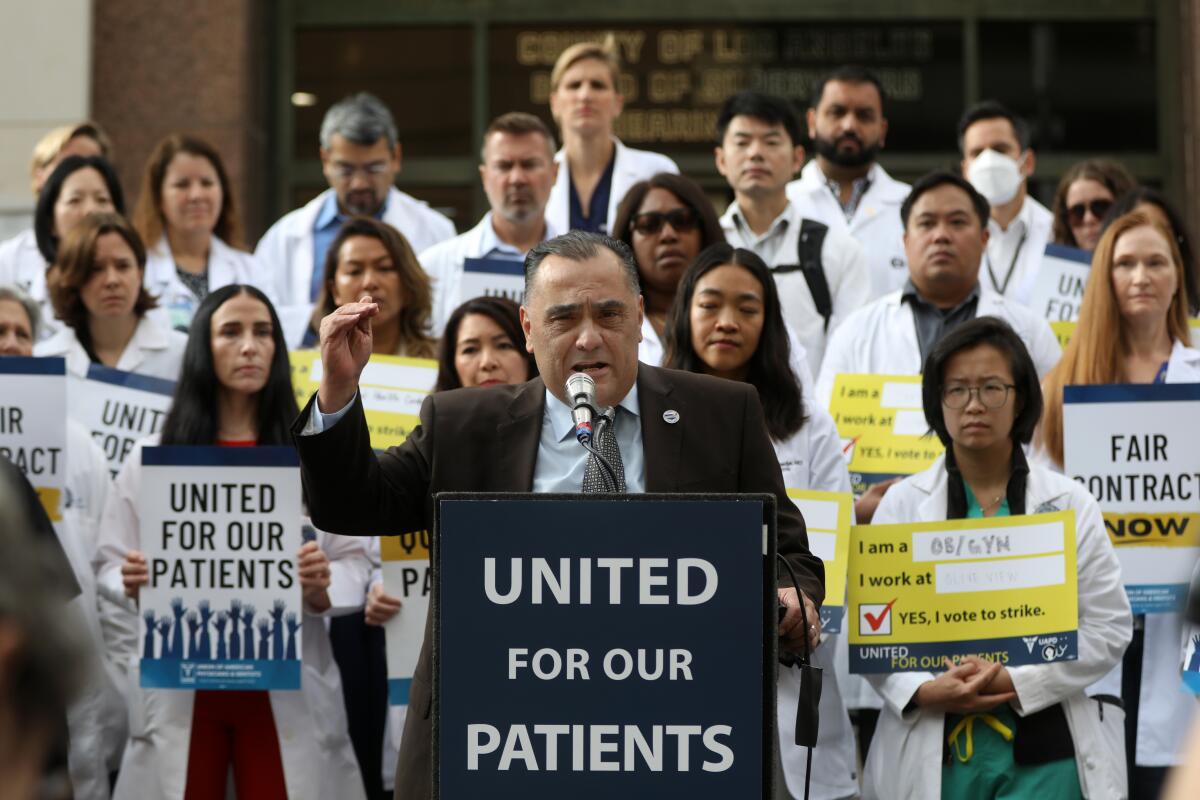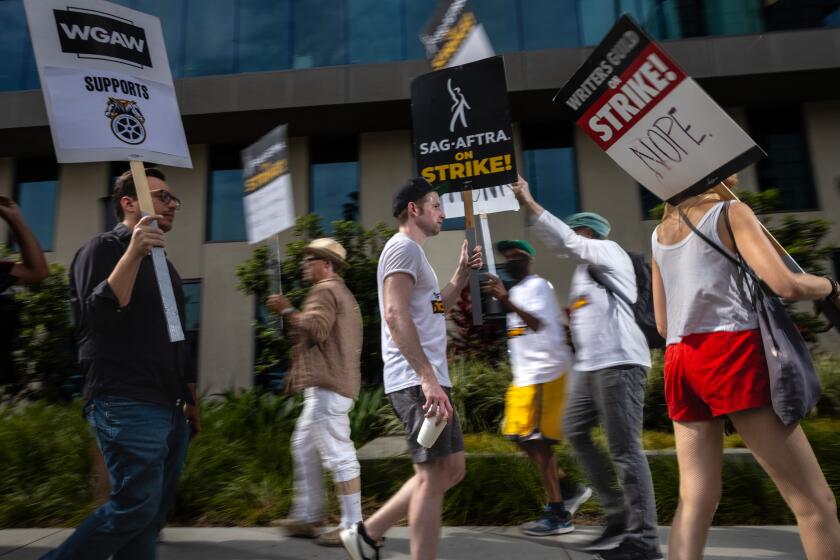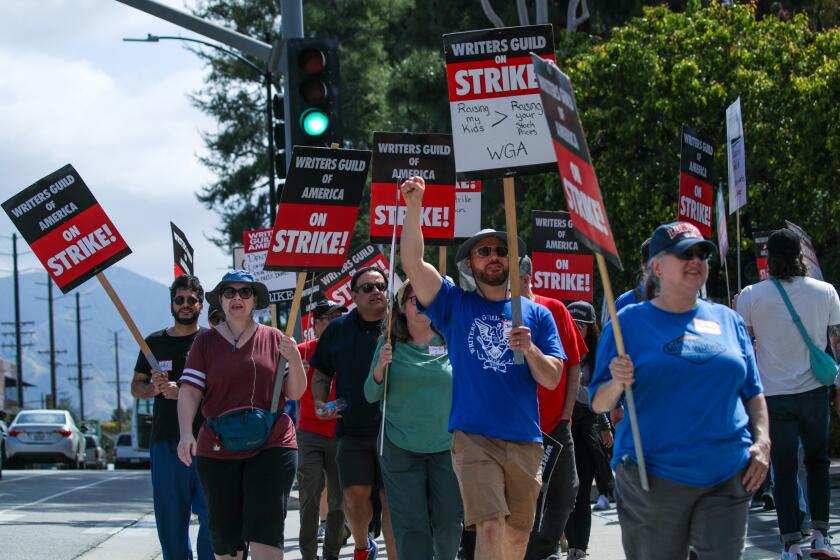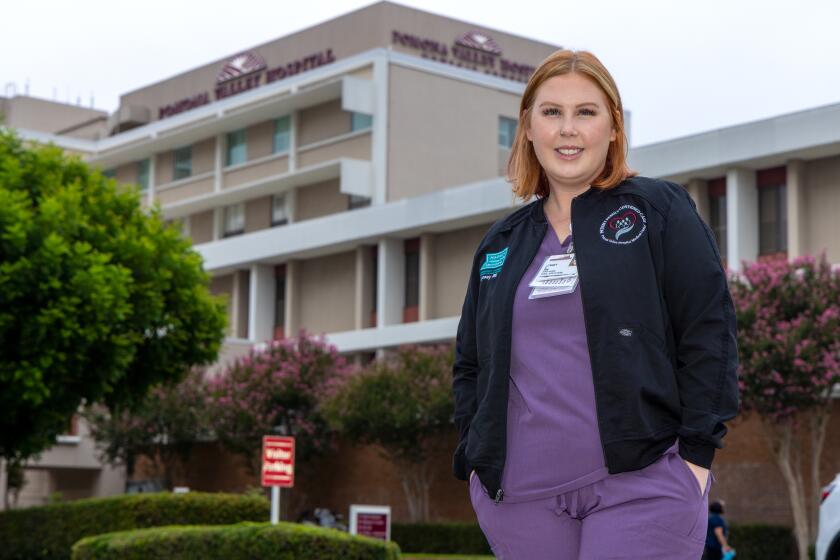L.A. County physicians weigh strike amid alarm about staff vacancies

Physicians and dentists who work for hospitals and clinics run by Los Angeles County and who care for patients in its jails and juvenile facilities are weighing a possible strike over what union officials argue are inadequate benefits that have hampered employee retention and led to alarming levels of vacancies.
The Union of American Physicians and Dentists said its members will begin voting Tuesday on whether to authorize a strike after more than two years of negotiations with the county failed to address their concerns.
The union represents more than 1,100 L.A. County employees in a pair of bargaining units that are weighing the possible walkout. Dozens of doctors in white coats and scrubs came to a county Board of Supervisors meeting Tuesday and said they were prepared to take action.
Union officials said many county departments that employ medical professionals have suffered from vacancy rates of 50% or higher, leaving physicians with heavier workloads and less time to spend with the people they care for. Patients “suffer from debilitating diseases, yet we get less than 15 minutes to figure out how to help them out,” said Dr. Jennifer Trif, who works at Rancho Los Amigos National Rehabilitation Center.
Los Angeles is sitting at the vanguard of two trends: increasingly expensive housing and an increasing amount of cross-union solidarity.
Among the medical professionals represented by the union are psychiatrists who work in the L.A. County jails, where the UAPD said the vacancy rate for medical professionals had hit 70%.
“You don’t always have the luxury of seeing patients as frequently as you need because of the shortages,” said Dr. Gary Pedneault, a psychiatrist who works in the county jail in Lynwood. With so many vacancies, “it’s like having one hand behind your back, trying to put out a fire.”
The L.A. County Department of Health Services said in a statement that it “values and appreciates our skilled and dedicated physicians and dentists” and that the county is actively engaged in negotiations with their union in an effort to reach “a fair and amicable agreement that safeguards patient care, values healthcare workers and enhances physician recruitment and retention in county service.”
The department said the medical professionals “already have an extensive benefits package in place” that includes “comprehensive medical, dental, and leave benefits among numerous other provisions.”
No strike notification has been received by the county from the union, DHS said. Patricia Castillo, a UAPD deputy regional administrator for Southern California, said that if members decide to authorize a strike, union representatives would meet with the county to discuss how essential services would be maintained during any work stoppage.
“Our doctors feel that’s the responsible thing to do,” she said.
The bulk of the UAPD medical professionals weighing a possible strike are employed by the Department of Health Services, but some work for other county departments, including mental health, public health and the medical examiner, according to figures provided by the union. In addition to doctors and dentists, the union represents a small number of veterinarians working for county agencies.
Doctors said they were not eager to stop seeing their patients, but would take the next step if needed.
“I don’t think they’re taking seriously the importance of being able to retain and obtain staff,” Pedneault said of the county. Pursuing a strike might be “the only way that they’re going to get it, unfortunately.”
The recent run of wins in the Legislature for organized labor was remarkable. Now Gov. Newsom must decide if union-backed bills will become law.
Union officials faulted an L.A. County benefits package that they say is short on important features such as supplemental disability insurance for new parents. That makes it hard to attract or retain doctors at county facilities, UAPD leaders said.
Newly graduated physicians want to start a family and “have to work day and night overtime to accumulate enough time so that they can have baby bonding time,” Castillo said.
Dr. Lisa Garcia, an OB-GYN at Olive View-UCLA Medical Center, said she repeatedly worked additional hours overnight while she was pregnant “to have something to cushion my maternity leave.” That exhausting schedule helped her stretch her time off to eight weeks, longer than it would have been otherwise, she said.
“It just makes this experience of trying to do right by your own family and take care of yourself in this time that’s supposed to be very joyous — it makes it very difficult,” Garcia said.
The Department of Health Services said in a statement that all county employees, including UAPD physicians and dentists, are entitled to 12 weeks of protected unpaid leave under federal and state law. They also have “access to paid leave options to cover and provide compensation during any unpaid leave,” the department said.
UAPD leaders said the benefits for new hires fall short of what is offered to some other county employees. L.A. County officials have estimated that extending those “Megaflex” benefits to all UAPD-represented doctors and dentists in the two bargaining units would cost at least $86.8 million per year, and the total cost “would increase with any negotiated salary increases,” according to a report from Dr. Christina R. Ghaly, the director of the Department of Health Services.
That cost “would make it prohibitive to consider such investments in wages and incentives by specialty, location and other hard-to-recruit roles for patient care,” Ghaly warned in a June report to county supervisors, and “would not place the Health Departments at a competitive recruitment advantage where it is most needed.”
Large numbers of registered nurses are relocating to California, in contrast to the recent flight of thousands of frustrated state residents moving out.
Union representatives said they disagreed with the county’s cost estimate and were seeking another one. The county has taken other steps to try to improve employee recruitment and retention, including snagging $27 million from the state to give workers “retention payments” in May, according to a report for the L.A. County Board of Supervisors.
The county is not alone in grappling with staffing issues, which have roiled health facilities across the country in the wake of the COVID-19 pandemic. In October, tens of thousands of Kaiser Permanente workers went on strike, saying the health giant had failed to bargain in good faith to address an understaffing crisis. Kaiser and its unions later reached a deal that included significant raises, which labor leaders said would improve employee retention.
The L.A. County medical professionals represented by UAPD will have two weeks to cast their votes on whether to authorize a strike, Castillo said. Union members are not voting on specific dates or duration for a strike, so the exact timing of any work stoppage remains to be determined.
More to Read
Sign up for Essential California
The most important California stories and recommendations in your inbox every morning.
You may occasionally receive promotional content from the Los Angeles Times.














